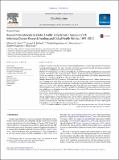| dc.contributor.author | Head, Michael G. | en_US |
| dc.contributor.author | Fitchett, Joseph R. | en_US |
| dc.contributor.author | Nageshwaran, Vaitehi | en_US |
| dc.contributor.author | Kumari, Nina | en_US |
| dc.contributor.author | Hayward, Andrew | en_US |
| dc.contributor.author | Atun, Rifat | en_US |
| dc.date.accessioned | 2016-03-01T19:50:57Z | |
| dc.date.issued | 2015 | en_US |
| dc.identifier.citation | Head, Michael G., Joseph R. Fitchett, Vaitehi Nageshwaran, Nina Kumari, Andrew Hayward, and Rifat Atun. 2015. “Research Investments in Global Health: A Systematic Analysis of UK Infectious Disease Research Funding and Global Health Metrics, 1997–2013.” EBioMedicine 3 (1): 180-190. doi:10.1016/j.ebiom.2015.12.016. http://dx.doi.org/10.1016/j.ebiom.2015.12.016. | en |
| dc.identifier.issn | 2352-3964 | en |
| dc.identifier.uri | http://nrs.harvard.edu/urn-3:HUL.InstRepos:25658524 | |
| dc.description.abstract | Background: Infectious diseases account for a significant global burden of disease and substantial investment in research and development. This paper presents a systematic assessment of research investments awarded to UK institutions and global health metrics assessing disease burden. Methods: We systematically sourced research funding data awarded from public and philanthropic organisations between 1997 and 2013. We screened awards for relevance to infection and categorised data by type of science, disease area and specific pathogen. Investments were compared with mortality, disability-adjusted life years (DALYs) and years lived with disability (YLD) across three time points. Findings: Between 1997–2013, there were 7398 awards with a total investment of £3.7 billion. An increase in research funding across 2011–2013 was observed for most disease areas, with notable exceptions being sexually transmitted infections and sepsis research where funding decreased. Most funding remains for pre-clinical research (£2.2 billion, 59.4%). Relative to global mortality, DALYs and YLDs, acute hepatitis C, leishmaniasis and African trypanosomiasis received comparatively high levels of funding. Pneumonia, shigellosis, pertussis, cholera and syphilis were poorly funded across all health metrics. Tuberculosis (TB) consistently attracts relatively less funding than HIV and malaria. Interpretation Most infections have received increases in research investment, alongside decreases in global burden of disease in 2013. The UK demonstrates research strengths in some neglected tropical diseases such as African trypanosomiasis and leishmaniasis, but syphilis, cholera, shigellosis and pneumonia remain poorly funded relative to their global burden. Acute hepatitis C appears well funded but the figures do not adequately take into account projected future chronic burdens for this condition. These findings can help to inform global policymakers on resource allocation for research investment. | en |
| dc.language.iso | en_US | en |
| dc.publisher | Elsevier | en |
| dc.relation.isversionof | doi:10.1016/j.ebiom.2015.12.016 | en |
| dc.relation.hasversion | http://www.ncbi.nlm.nih.gov/pmc/articles/PMC4739409/pdf/ | en |
| dash.license | LAA | en_US |
| dc.subject | Infectious disease | en |
| dc.subject | Research investment | en |
| dc.subject | Disease burden | en |
| dc.subject | Global health | en |
| dc.subject | Funding | en |
| dc.title | Research Investments in Global Health: A Systematic Analysis of UK Infectious Disease Research Funding and Global Health Metrics, 1997–2013 | en |
| dc.type | Journal Article | en_US |
| dc.description.version | Version of Record | en |
| dc.relation.journal | EBioMedicine | en |
| dash.depositing.author | Fitchett, Joseph R. | en_US |
| dc.date.available | 2016-03-01T19:50:57Z | |
| dc.identifier.doi | 10.1016/j.ebiom.2015.12.016 | * |
| dash.contributor.affiliated | Fitchett, Joseph | |


